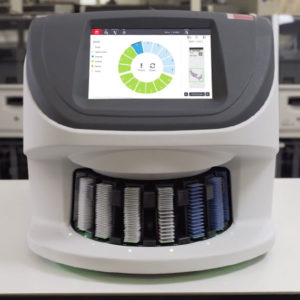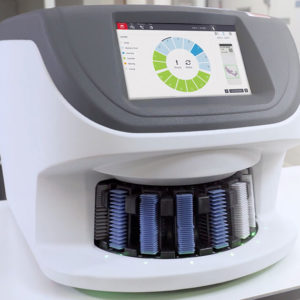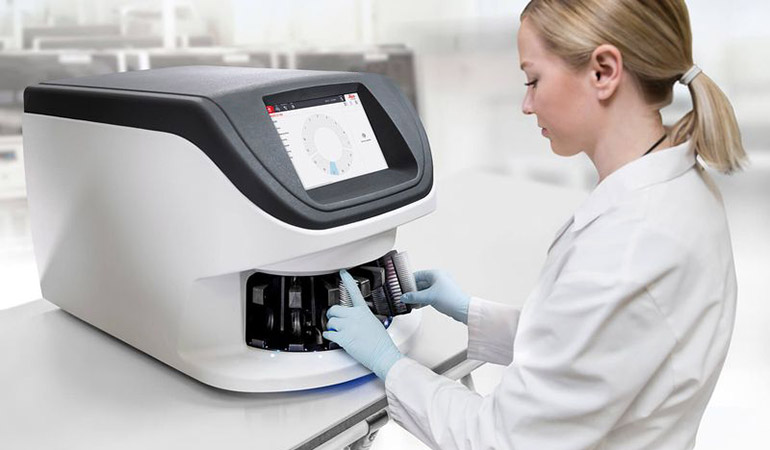The truth is, we get excited about every plastics manufacturing project that comes into our California-based facility. Still, there are plastic pressure forming projects that stand out for our whole team.
Let us tell you about one of those.
Recently, a leading biotechnology company came to us for help creating the housing of an advanced digital pathology slide scanner.
The project demanded impressive aesthetics, incredible levels of precision, and high-performance materials. In short, it was precisely the type of pressure forming project we love.
A 26” Deep Single-Piece Assembly
 Typically, the standard design for this type of medical equipment has 3, 4, or even five panels. For this project, the client had an unusual request: they wanted the entire enclosure manufactured as a single unit. Ray Products is built to handle engineering and production challenges like this. To manage the design, we connected the client with a talented, 3rd party product design firm we knew could deliver an expert design solution.
Typically, the standard design for this type of medical equipment has 3, 4, or even five panels. For this project, the client had an unusual request: they wanted the entire enclosure manufactured as a single unit. Ray Products is built to handle engineering and production challenges like this. To manage the design, we connected the client with a talented, 3rd party product design firm we knew could deliver an expert design solution.
The biotechnology company wasn’t just trying to make our pressure forming manufacturing project challenging – their plan had real benefits. Their single-piece enclosure design allowed the entire machine’s internals to slide in the enclosure on rails. Assembly was quick and easy, and serviceability was significantly improved. Instead of removing several panels to get at the machine’s internals, all a tech has to do is slide it out of the enclosure. They can access the machine’s internals in a matter of seconds, instead of minutes.
That meant manufacturing the entire pressure formed enclosure out of a single piece of material, with a starting thickness of 3/8 of an inch and a 5:1 draw ratio. We selected fire-rated Kydex T, a specially formulated ABS material that offers compatibility with a range of corrosive chemicals and cleaning solutions commonly used in a pathology laboratory. We worked with our mold manufacturer to develop a custom mold that could create the single unit enclosure, and deliver the type of repeatable precision the project demanded.
Precision Robotics
Notice the six small, illuminated holes on the front of the unit? Each one contains a colored LED light pipe that provides valuable status information for the machine’s operator. They also would have represented an impossible challenge without the help of our highly accurate 6-axis robotic trimming robots.
Industry-standard tolerances for trimmed features like this in thermoformed parts are ± .020”. For this project, we committed to cutting those tolerances by half, leaving virtually no room for error. Luckily, this wasn’t a problem for either our robots or their highly skilled operators.

Finishing & Assembly
For aesthetic purposes, our client chose to have the exterior of the enclosure painted in a 2-tone paint scheme. Typically, we’d paint the interior with an EMI/RFI shielding, but with a 26” deep part, that would have been a challenge.
So, instead, we worked with the client to find an innovative solution: an EMI/RFI mesh that we could affix to the inside of the enclosure.
To finish things off, we installed two rails at the bottom of the enclosure, which allowed the machine’s plastics enclosure to easily slide in and out of the cabinet for assembly and maintenance.
Client Feedback
A little while after the last completed enclosures left our factory, Jason Middleton, our VP of Sales and Development, got the most satisfying email from the client’s Director for R&D and Imaging Solutions.
“We are glad to announce that [the new product] has launched. Orders are coming in with systems being built and shipped.
We want to thank you for your support throughout the development of this new product and look forward to the continued success of this new product offering. The contribution you’ve made has enabled us to create the next generation of digital pathology scanner that is advancing cancer diagnostics and improving patient lives. […] We look forward to a continued relationship and sincerely appreciate the high level of quality that you provide to our company.”
As we said, we get excited about every plastics manufacturing project we have the opportunity to participate in, but not every project we’re involved in goes out in the world to join in the fight against cancer.
We want to thank our partners for allowing us to be involved with this project. It was a privilege, and we’re excited to work with you in the future. View a case study of this digital pathology slide scanner and download our Lessons Learned whitepaper in medical device manufacturing.
